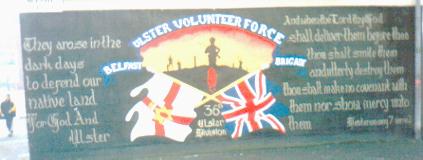1990
Is Ulster really British?
The Third Way movement rejects the present unitary British State. This is not
because we are 'unpatriotic' or 'anti-British', but because we recognize that
Britain is not a nation. These British Isles are home to a family of nations
which are linked together by a common heritage, history and destiny.
The attempts of the State to build a homogeneous Greater English 'British'
identity have largely failed. few Scots folk would describe themselves as 'North
Britons', nor would many Welsh be happy to be called 'West Britons'
In fact, the only part of the United Kingdom where most of the population do describe themselves first and foremost as 'British' is in the UK's most peripheral province Ulster. This probably seems odd to most English people who, if they ever give any thought to Ulsterfolk would hardly regard them as fellow 'Britons', no matter how often they wave their Union Flags.
UNIONISM
Why are Ulster unionists and loyalists the only self-confessed 'Britons'? This question can only be answered by looking back into the past. Loyalists and unionists have traditionally supported the Union as a guarantee of their identity and political, religious and civil liberty. Unionism became the dominant political creed from the latter part of the Nineteenth Century until the present day.
Unionism's underlying assumption is that Ulster cannot survive without the Union. Certainly, the Ulster Unionist Party regards the Union as an end in itself, rather than as a means to an end. Unionism is still stuck in Nineteenth Century attitudes. The Third Way movement argues that although the Union may have been of benefit to Ulster in the past, it is time for change. The Union is dead. Ulster is treated today as a colony where the natives cannot be trusted. They are governed by a joint Westminster/Leinster House secretariat. The Union now only serves to wear down Ulster's resistance prior to its incorporation into the Irish Republic.
NATIONAL IDENTITY
In the past twenty years, there has been a welcome re-examination of past attitudes by a number of academics, historians and former Ulster unionists. Crucial to this has been the concept of national identity. The people of Ulster are neither Gaelic-Irish nor Saxon-English but a distinct cultural entity. The late Professor E. Estyn Evans observed that: "The two communities in the north, however deeply divided by religion, share an outlook on life which is different from that prevailing in the south and which bears the stamp of a common heritage".
NATIONAL CONSCIOUSNESS
The recent emergence of such cultural bodies as the Ulster Society and the Ulster Historical Society, the publications of Pretani Press and Ulster Origins magazine have done much to reinforce the Ulster national consciousness. A growing number of Ulsterfolk have recognised that Ulster has no future within the British State. Unionism has failed. Irish Republicanism -the doctrine that Ulster should cease to exist and should be dragged kicking and screaming into an All-Ireland Republic can never succeed. What can be done? Is there a third alternative for Ulster?
INDEPENDENCE
The Third Way movement naturally believes that there is. We advocate independence for Ulster from both Britain and Eire. A small Ulster independence lobby has existed since 1972. The signing of the Hillsborough Pact in 1985 smashed beyond repair the last vestiges of the Union and give new credibility to the independence option. The booklet, Alternative Ulster, was published last year to examine the options open to the Ulster people. It rejected the present semi-colonial set-up as inherently unjust and undemocratic. It condemned the PIRA's aim of a 'united' Ireland as imperialist, arguing that such an outcome would be disastrous for both peoples of the island of Ireland. It argued that independence can give all Ulsterfolk, whatever their religious views, a full stake in their own country. The Third Way movement in Ulster is actively campaigning for Ulsterfolk to build a new political loyalty to their own Motherland. The greatest danger to the future of Ulster lies in the fact that many of her people are prisoners of their traditional loyalties to outside states.
David Kerr
home page